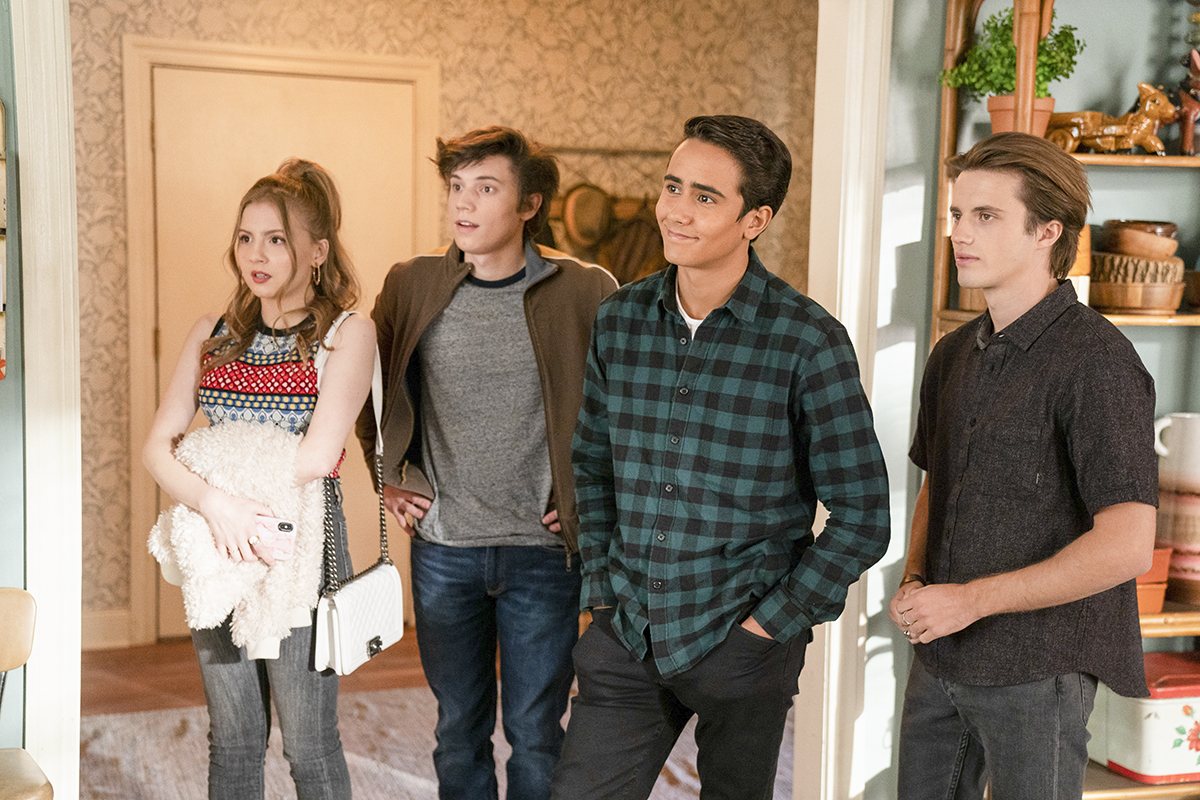
After struggling through his sophomore year to accept his sexuality, Victor Salazar, the virtuous but imperfect high school hero of Hulu’s Love, Victor (★★★☆☆), took a giant leap forward in the final moments of season one, announcing to his parents, “Mom, Dad, I’m gay.”
Somewhat defying expectations, it’s been practically all rainbows and kisses for Victor (Michael Cimino) since then, as tipped by the title of season two’s first episode, “Perfect Summer Bubble.” The 17-year-old got the summer he wanted with the boy he wanted, Benji (George Sear), the toothsome twosome slinging lattes side-by-side at the Central Perk of their leafy Atlanta suburb. But their bubble’s set to burst as the lovebirds return to Creekwood High, where Victor, known as a straight basketball star dating popular girl Mia (Rachel Hilson), risks it all by going public with his and Benji’s relationship.
In its engaging second season, the Love, Simon spinoff heaps adversity onto the shoulders of Victor, his family, and friends, yet still maintains its footing as a light, romantic drama — most of the time. Showrunner/creators Isaac Aptaker and Elizabeth Berger steer towards soapy excess with an arc involving Victor’s best bud Felix (Anthony Turpel) coping with his mom’s declining mental health. Confessions are made, awkward, emotional scenes erupt, and, too often across the season’s ten episodes, the writers turn to blatant or unintended betrayals to drive a wedge between characters. “You betrayed my trust” might be the mantra or drinking game that defines the melodramatic mood of everything to do with Felix and girlfriend Lake (Bebe Wood) this season.
Victor also contends with mother issues, but in a more credibly written and acted storyline that finds his casually Catholic mom, Isabel (Ana Ortiz), seriously conflicted about her number-one son being gay. Fans of Ugly Betty will recall Ortiz’s impassioned performance on that dearly departed comedy as a mom who championed her gay son. In this show’s most compelling performance, Ortiz portrays a loving mom so uncertain of how to accept — if she can accept — her son, that she stays afraid of doing or saying the wrong thing.
 100vw, 1200px”><figcaption id=) Love, Victor: Michael Cimino, George Sear — Photo: Greg Gayne/Hulu
Love, Victor: Michael Cimino, George Sear — Photo: Greg Gayne/HuluThe show plays Isabel’s rocky journey both for resonant humor and for the angst it causes Victor, his siblings Pilar (Isabella Ferreira) and Adrian (Mateo Fernandez), and even Benji, whom Isabel can barely restrain herself from antagonizing. The tension also adds to the yawning distance between Isabel and Victor’s dad, Armando (James Martinez), still separated and leading ever more separate lives.
In contrast to his wife, who consults the family priest, Armando tries to understand his son by joining PFLAG. The show conveys beautifully that whether or not Armando and Isabel survive as a couple will depend largely on their growth as individuals through Victor’s coming out process. Thus, the question hangs over all the Salazars how they will survive as a family.
Meanwhile, the show introduces a new queer character, Pilar’s fashionable friend Rahim (Anthony Keyvan), with his own familial tension to navigate. Inspired by Victor, Rahim wants to come out to his parents, who are devout Muslims — a distinction depicted with the same box-checking, bare-bones detail that characterizes the mental illness storyline. Rahim is much more intriguing as a potential spoiler in the Victor-Benji romance.
No longer the potential spoiler in that relationship, Victor’s ex Mia pursues a new romance with the fervor of a girl who constantly gets shafted by the plotting on this show. Hilson keeps the character delightful, despite Mia’s parade of misfortunes, and she even gets her own cliffhanger ending for the season, as does Victor, of course. On the strength of Cimino’s poised performance, Love, Victor and its hero stand on the precipice of some life-changing choices that may not be fully revealed until the door opens on season three.
Love, Victor seasons 1 and 2 are available for streaming on Hulu. Visit www.hulu.com.
Read More:
‘Sublet’ review: Gay drama struggles to make a connection
TV Review: Netflix’s ‘Feel Good’ delivers a satisfying, three-dimensionally queer relationship
Road Head review: Sharp, witty gay horror with a gruesome climax

